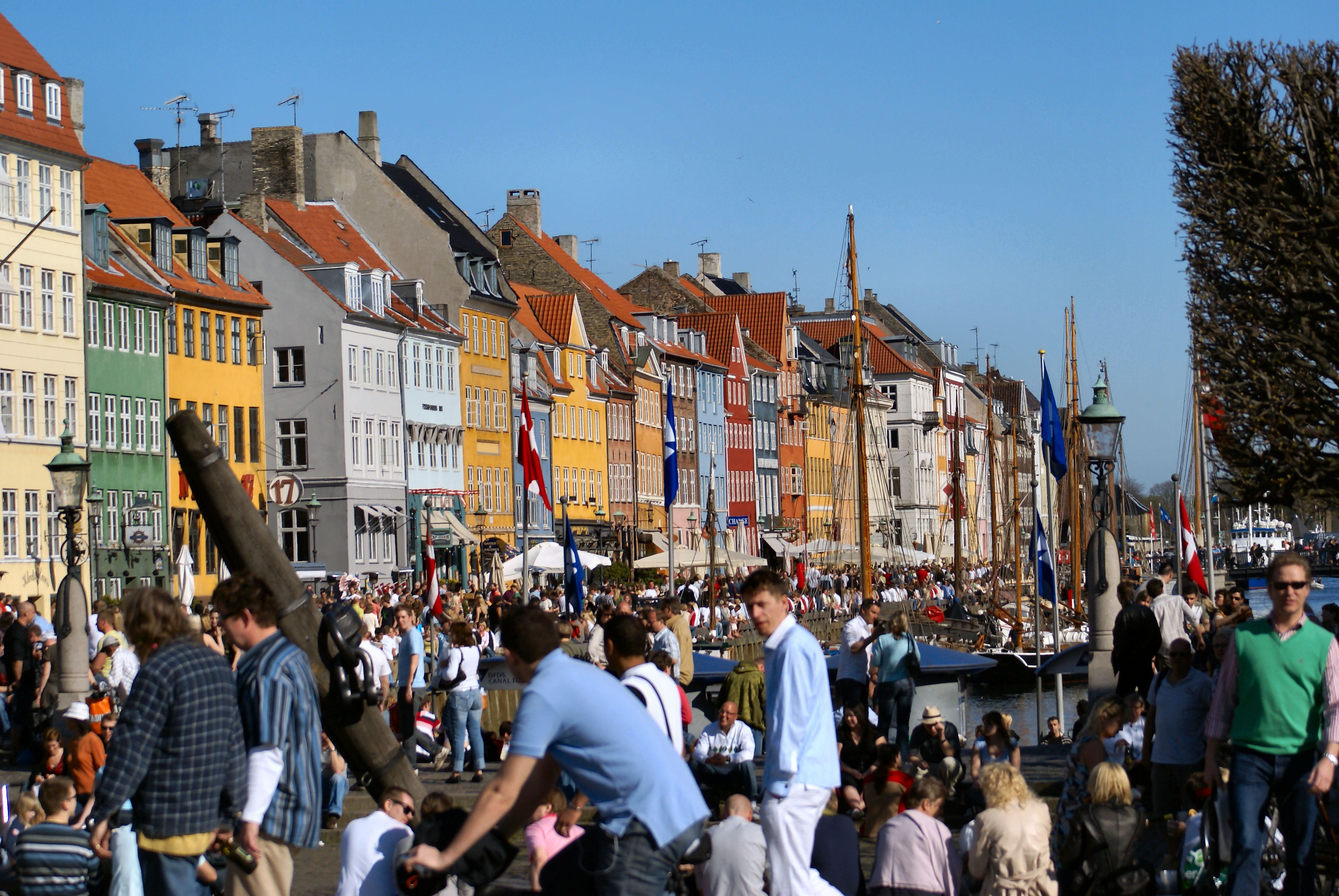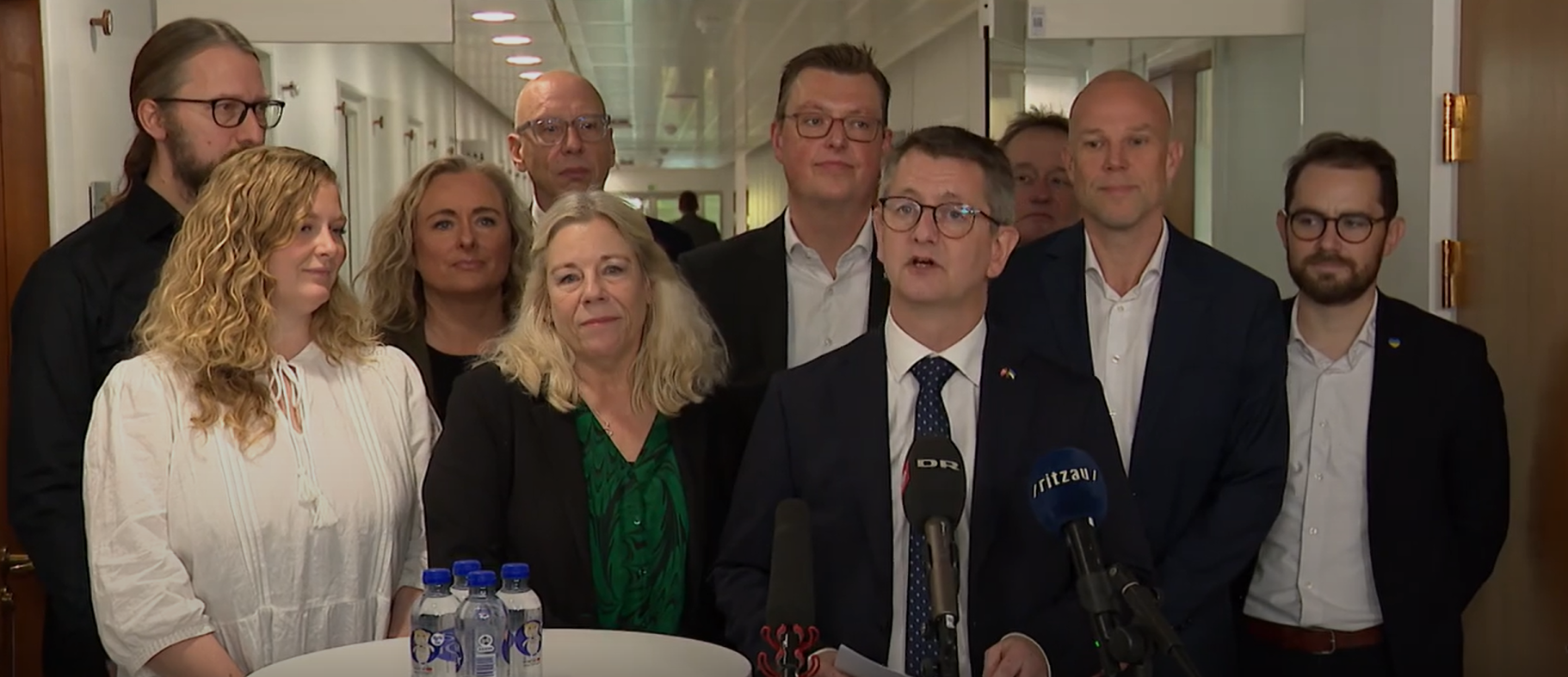Two demonstrations faced off in Aarhus last week on Saturday. The European Counter-Jihad Meeting – organised by British anti-Islam organisation the English Defence League (EDL) – was hailed as the start of a pan-European anti-Islam movement. In response, anti-fascist and pro-diversity groups staged a counter demonstration that snaked through the city. The former had a couple of hundred attendees at its peak, the latter over 4,000.
Ahead of the EDL’s rally, the domestic intelligence agency, PET, warned that members of violence-prone, right-wing groups from eastern Europe had promised to make the journey and show their support. Anticipating clashes between protesters, Danish police staged the largest security operation Aarhus had ever experienced.
The day started quietly on Mølleparken, the site of the European Counter-Jihad Meeting, with about 50 people milling about. Among them was Peter, who wore Arabic clothing while holding an Israeli flag and a sign stating, ‘Stop the Islamisation of Europe.’
“I’m protesting the ongoing Islamisation in Denmark,” he said. “Someday, we might all have to dress like this.”
A German couple, Gertrude and Christian Schmidt, had also made the journey. Unlike Peter, they looked like an ordinary, white, middle-class couple.
“We think Europe is facing a great challenge. Muslims are bringing with them an old justice system, Sharia law, and it’s not good for women,” Gertrude said. “If you have read the Koran, you will see what is coming. It’s very dangerous. Muslims have to do what’s in the Koran. They are not allowed to be individuals.”
The meeting may have been subdued, but the message was controversial. They argued that Islam is an undemocratic, misogynistic and violent ideology that leaves its followers with no capacity to make moral decisions of their own. Islam seeks to spread across the globe, they argued, and migration from Islamic countries into Europe threatens the very fabric of Western culture. As a result, it has to be stopped.

One does not have to look far for examples to confirm the Schmidts’ suspicions. From last month’s deadly shootings by a Muslim extremist in Toulouse, France, to the attempted assassination of Kurt Westergaard, the man behind the controversial ‘Mohammed cartoons’, the ongoing conflict between the West and the Islamic world is played out on multiple fronts, both at home and abroad.
Despite the police’s fears, violent neo-Nazis and members of racist, football-hooligan communities were conspicuously absent from the European Counter-Jihad Meeting. According to assistant professor Susi Meret from Aalborg University, an expert in Danish far-right groups, this was due to deliberate attempts by organisations such as the EDL to dissociate themselves from openly anti-Semitic and racist groups.
“This is something I have observed in the past decade,” Meret said. “Since about 2005, some of the groups began distancing themselves from extreme and neo-Nazi environments.”
Meret added that, in Scandinavia, the anti-Islam message has crept into mainstream politics through parties such as Dansk Folkeparti, whose goal is the preservation of a homogeneous Denmark.
“They play on the fears of Islam and cultural diversity in socially-cohesive countries where being united is valued,” she said. “They see being the same as natural, and being diverse as unnatural, because multiculturalism is often difficult to get right. For many, it is just hard to come to terms with.”
While the EDL’s roots are found in the British football-hooligan environment, its attempts to become a legitimate political player were clear in Aarhus. Leader Tommy Robinson bore a t-shirt that stated, ‘EDL HATES NAZIS AND ISLAMISTS’ and repeatedly told the sea of journalists that the EDL was not a violent organisation.
“We’re not far-right; we’re normal people,” he said. “A lot of people have mistakenly been told by the media that we are racist or Nazis. We’re the complete opposite. I don’t care about the other people. We’re the ones who want to stand up for freedom and democracy; they are the ones who wish to end freedom and democracy.”
Robinson was referring to what he called the ‘violent people’ and the ‘far-left’ who had gathered to oppose the meeting at Mølleparken. A couple of hundred black-clad anti-fascists and about one hundred second-generation Danes successfully disrupted the meeting by throwing stones, bottles and fireworks at the police. Eighty-two people were arrested during the day.

But the vast majority of the over 4,000 people at the pro-diversity demonstration peacefully made their point. Among them was Solveig Munk, who held a banner reading ‘Aarhus for mangfoldighed’ (Aarhus for diversity) at the head of the demonstration.
“Last time it was Jews; now it’s Muslims,” she said. “I’m a child of the war and I saw what happens when people don’t stand up to people with messages like these. Hate should not be allowed to grow.”
Many others on the pro-diversity march repeated this message. They argued that the EDL promotes a hateful ideology based on stereotypes that resulted in the victimisation of a minority group, similar to Nazi Germany’s treatment of Jews.
Listening to Robinson’s speech in Mølleparken, it was not hard to see how they arrived at the conclusion. Between allegations that European leaders had been bought by Saudi oil money in order to allow the Islamisation of Europe, Robinson claimed Muslim immigrants were responsible for turning the Swedish city of Malmö into the ‘rape capital’ of Europe. The insinuation is that any criminal act carried out by an individual who is a Muslim is done because of faith. No other factors, such as education level or socio-economic background, is relevant. In Robinson’s view, immigrants in Sweden rape because they are Muslim.
Many Muslims would not agree with the EDL’s understanding of Islam. Wisam Said Muhanna, a practicing Muslim, stood overlooking the park as police attempted to bus out attendees of the Counter-Jihad meeting. He said he had come to take a look and see what sort of people still held these views.
“They are against Muslims and foreigners, so we have come to see them. I think it is embarrassing to still have people like this in our society,” he said. Originally from Palestine, Muhanna moved to Denmark 20 years ago and currently works for the Defence Ministry.
“Foreigners work in lots of jobs in Denmark: the police, the council or at hospitals,” he said. “We just want to be accepted, and I think after seeing the demonstrations today, a majority of Danes agree with us.”
Most international media branded the Counter-Jihad Meeting as a flop due to the low turnout. But as a result of the media interest the meeting generated, Robinson achieved his goal of spreading the EDL’s message as far as possible.
“Every person in Denmark, by the end of the day, will have heard about the Danish Defence League. They will then join their ranks,” Robinson said during his speech.
Two groups demonstrated on Saturday to express their distinct fears. The EDL’s meeting was based on a fear that Islam will creep into and take over Europe and thus should be repelled. Their opponents argued that targeting Muslims violates the West’s inclusive and democratic values and could justify genocide.
So will Robinson’s movement grow as people decide that marginalising a minority based on a narrow reading of their religious text is justifiable? Or will people oppose Robinson’s movement on the basis that stereotyping and victimisation of a minority group is the first step away from an enlightened and inclusive Western society? Time will tell.
Some names in the story have been changed per request.











